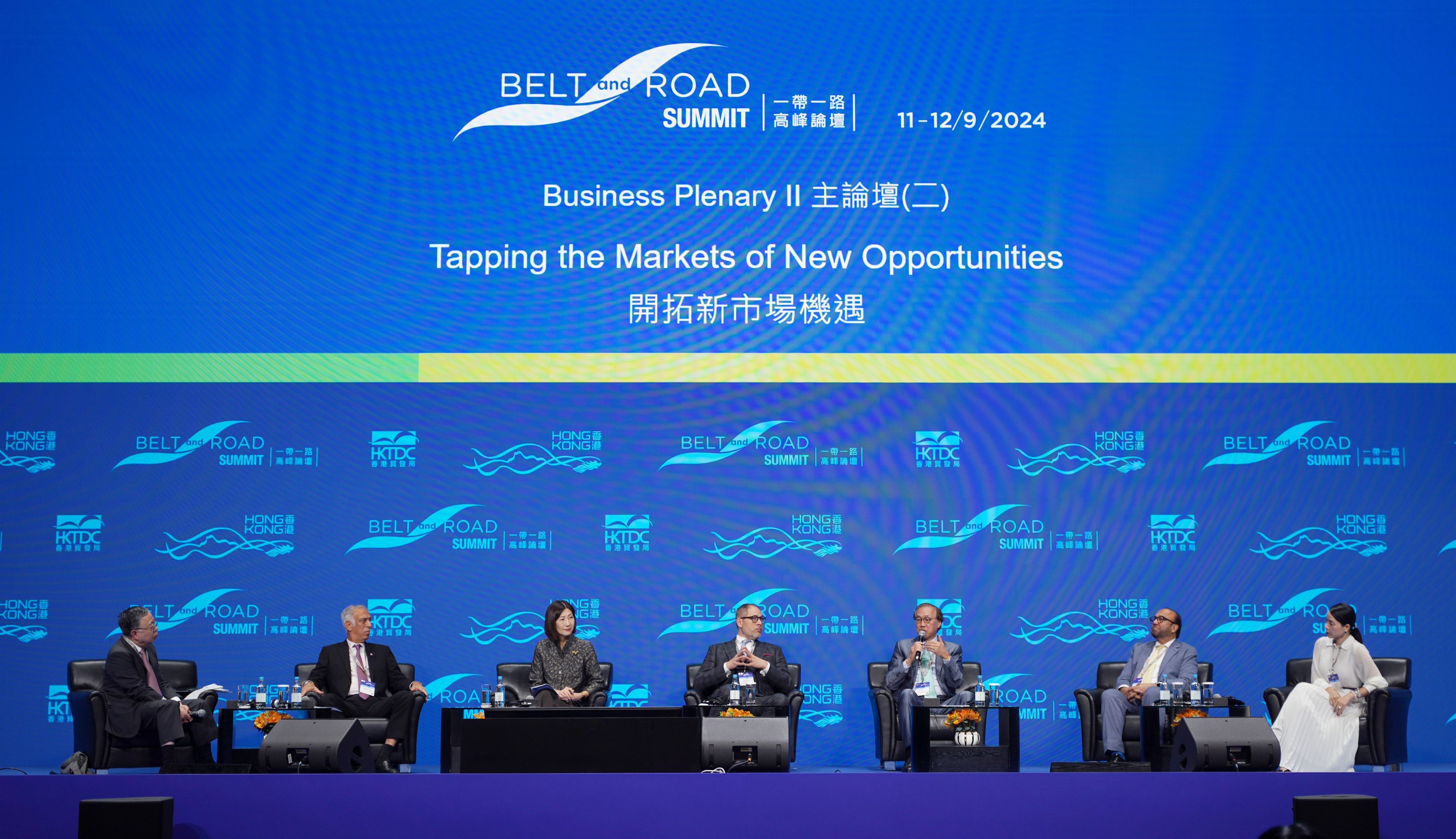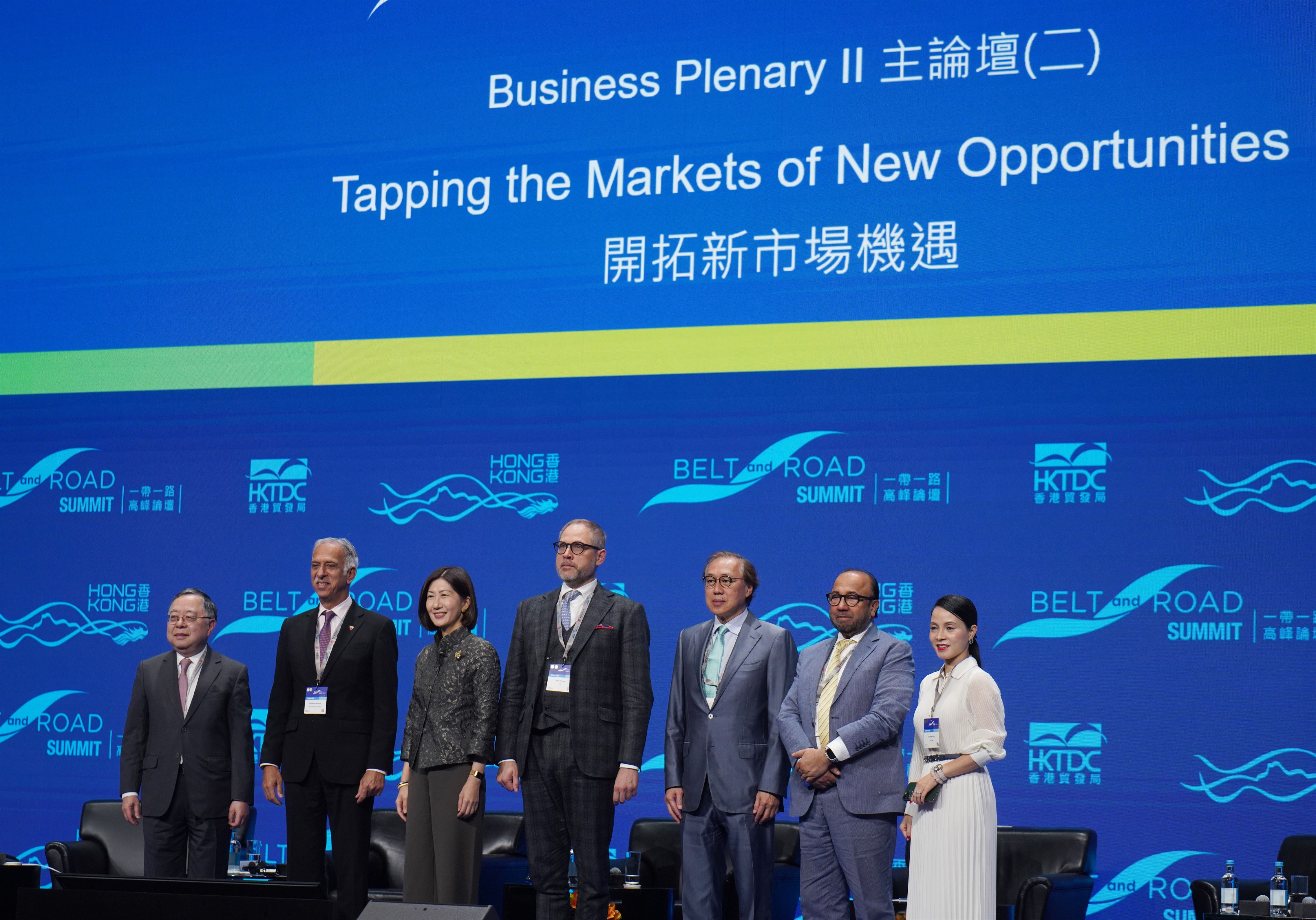
Despite global rhetoric suggesting a world becoming less connected, business leaders from across continents gathered in Hong Kong on Thursday to endorse the Belt and Road Initiative. They declared it a well-timed and time-honored response to humanity’s unstoppable pursuit of common development and shared prosperity, and urged strong resolve and collective efforts to leverage Hong Kong for higher-level collaboration.
The Belt and Road Initiative traces its origins back to “one of the most active trade and investment routes anywhere in the world in those days”, said Ronnie Chan Chi-chung, honorary chair of Hang Lung Properties Ltd, referring to activities that have been ongoing for some 3,000 years, during a panel discussion at the 9th Belt and Road Summit in Hong Kong.
Eric Ip, group managing director of Hutchison Port Holdings, told the discussion themed “Tapping the Markets of New Opportunities” that the Hong Kong-based port operator has established a global footprint in 53 locations across 24 countries over the past three decades, of which 33 are in 14 countries along the Belt and Road route. “This is by no means a coincidence, as the Belt and Road essentially started a long time ago.”
Citing a popular adage in the Muslim world, “Seek knowledge even if you have to go as far as China”, Iqbal Ahmad Khan, chief executive officer of the UAE-based private equity investor Fajr Capital, said the China-spearheaded initiative comes at a critical juncture when tendencies to deglobalize and decivilize are casting a shadow over the world.
From a historical perspective, he said, the Belt and Road Initiative has essentially replaced the US-sponsored Marshall Plan, a massive commitment to Europe’s recovery after World War II, with little regard for other parts of the globe that had been devastated by the bloodiest conflict in human history.
Among the great changes that are occurring, “the Belt and Road Initiative comes as a relief to so many countries,” he said. “The leadership of China deserves to be commended for this initiative.”
Khan highlighted a major revolution that every Gulf Cooperation Council country — Bahrain, Kuwait, Oman, Qatar, Saudi Arabia and the United Arab Emirates — is undergoing, which involves the dedicated pursuit of people’s well-being, economic diversification, and plays a part in the world ecosystem.
At the heart of the revolution is the “massive evolution of partnership with China”, in which many sovereign wealth funds are increasing their exposure to Chinese markets, and GCC countries are focusing their attention on China as a go-to destination for addressing the supply chain headaches, Khan said.
Bonnie Chan Yi-ting, CEO of Hong Kong Exchanges and Clearing, said she has noticed a growing interest from the sovereign wealth funds of GCC countries in Chinese markets, especially in key green industries such as solar power, electric vehicles and lithium-ion batteries, in which China leads the charge and holds a dominant position.
To be sure, she said, the urgent need to accelerate a green transition has become the focal point for GCC economies and the world beyond in their quest to find the next growth engine. And in this regard, there is another matter of urgency: money.
Taking China as an example, Bonnie Chan said that the money needed for the world’s second-largest economy to meet its goal of carbon neutrality by 2060 is as much as $21 trillion.
This is where Hong Kong can help, by capitalizing on its well-established financial infrastructure and unique advantages, she said.
Bonnie Chan made history in March as the first woman to serve as CEO of the city’s bourse operator, which runs Asia’s third-largest stock exchange by market capitalization.
The city’s long-cherished market openness makes it a connector linking money from all around the world. And the Stock Connect cross-border trading program “stands as a secret weapon that distinguishes the Hong Kong Stock Exchange from its global peers”, she said.

The dire need for investment and financing also underscores the significance of multicooperation. “What we are seeing today is a reversal of globalization,” said Peter Fekete, group CEO of Hungarian telecoms group 4iG. “For economies like Hungary and many other Central and Eastern European countries, openness and a willingness to trade is very important.
“Hungarian companies today are really hungry to do more business and develop more relationships,” he said.
As government-to-government collaboration continues to bear fruit under the Belt and Road Initiative, Khan said, the next big story to unfold should be that more world-class multinationals in the region are joining hands with counterparts in other parts of the world.
Ronnie Chan said he has witnessed “an irresistible trend” in which Chinese mainland companies, including ambitious large enterprises and promising small and medium-sized firms, are vying for a global presence in a more proactive manner.
This would have been unimaginable some 20 years ago, when the best companies in the country simply had their sights set on the domestic market, he said.
The “going global” push could translate into tremendous opportunities for investment and cooperation for Hong Kong and other economies involved in the Belt and Road Initiative.
Mohamed Abduljabbar Alkoheji, second vice-chairman of Bahrain’s Chamber of Commerce and Industry, called for a down-to-earth approach to getting things started.
For a worldwide initiative of such kind, he said, much more work should be done to “turn red tape to red carpet”.
“There are three kinds of leaders: Those who make things happen, those who watch things happen, and those who wonder what happened. We want to be the people who make things happen,” he added.
Bonnie Chan cautioned that the main obstacle to the high-quality Belt and Road development is the fact that the “decision to deploy capital is not pure, not based on economic theories. There are a lot of things getting in the way.”
But “collective success from countries and regions is exactly the spirit of the Belt and Road Initiative. And this is what makes the massive initiative the most powerful,” she added.
“Hong Kong, being connected with the rest of the world, is very much money-driven rather than politics-driven,” said Ronnie Chan. “Let’s not bifurcate the world. Instead, let’s connect with money, trade and investment.”
Contact the writer at sophialuo@chinadailyhk.com


